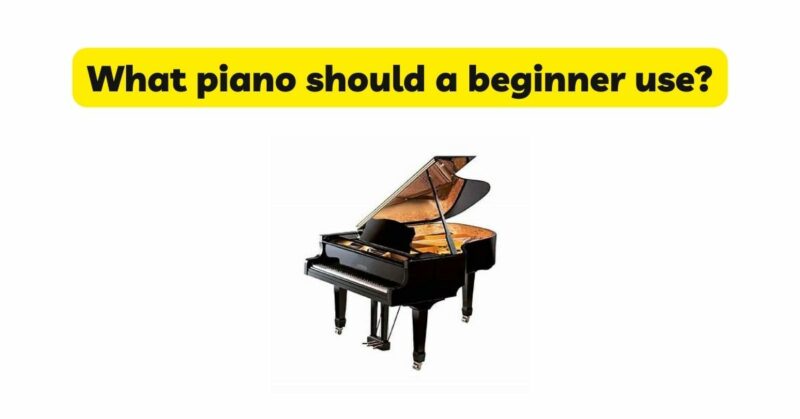As a beginner embarking on your musical journey, choosing the right piano is a crucial decision. The instrument you select will significantly impact your learning experience and progress. With a wide range of options available, it’s important to consider factors such as type of piano, affordability, quality, and long-term aspirations. This article aims to guide beginners in choosing the most suitable piano, taking into account various considerations and providing insights into acoustic and digital pianos.
Understanding the Types of Pianos:
- Acoustic Pianos: Acoustic pianos are traditional, wooden instruments with strings and hammers that produce sound when keys are pressed. There are two main types: upright pianos and grand pianos. Upright pianos are more compact, making them suitable for smaller spaces, while grand pianos offer superior sound and performance but require more space.
- Digital Pianos: Digital pianos are electronic instruments designed to replicate the sound and feel of acoustic pianos. They utilize sampled piano sounds and have weighted or graded keys to simulate the touch of an acoustic piano. Digital pianos offer additional features such as headphone connectivity, recording capabilities, and a range of instrument sounds.
Choosing the Right Piano for Beginners:
- Affordability: For many beginners, affordability is a primary consideration. Digital pianos tend to be more cost-effective than acoustic pianos, making them an excellent choice for those on a budget. Digital pianos offer a range of prices, allowing beginners to find an instrument that suits their financial resources. However, it’s important to strike a balance between affordability and quality to ensure a satisfying playing experience.
- Quality and Playability: Regardless of the type of piano chosen, quality and playability should be prioritized. Look for pianos that offer good construction, responsive keys, and a balanced tone. Digital pianos with weighted or graded keys provide a more realistic playing experience, closely resembling the touch of an acoustic piano. Acoustic pianos should be in good condition, with reliable tuning stability and a pleasing sound.
- Space Considerations: Consider the available space in your home or practice area. Upright pianos are more compact and can fit into smaller spaces, while grand pianos require more room. Digital pianos, being more portable and space-efficient, can be suitable for beginners with limited space or those who may need to move or transport their instrument.
- Long-Term Goals and Aspirations: Consider your long-term goals and aspirations as a pianist. If you envision yourself pursuing piano playing seriously and performing at a higher level, an acoustic piano may be a worthwhile investment. Acoustic pianos offer a unique touch and sound that can enhance your playing as you progress. However, if your goals are more casual or focused on versatility, a high-quality digital piano can provide the necessary features and functionality.
- Brand Reputation and Research: Research different brands and models to find a reputable manufacturer known for producing reliable instruments. Brands such as Yamaha, Kawai, Roland, and Casio have established themselves as leaders in the digital piano market, offering a wide range of options to suit various budgets and needs. For acoustic pianos, consider well-regarded manufacturers with a history of producing quality instruments.
- Try Before You Buy: Whenever possible, try out different pianos before making a purchase. Visit music stores, attend piano showrooms, or seek opportunities to play on different instruments. This hands-on experience will help you assess the touch, sound, and overall feel of the piano, allowing you to make an informed decision based on your personal preferences.
Conclusion:
Choosing the right piano for beginners involves considering factors such as affordability, quality, playability, space considerations, long-term goals, brand reputation, and personal preferences. Digital pianos offer cost-effective options with various features and portability, while acoustic pianos provide an authentic touch and sound. Ultimately, the choice depends on your individual needs, aspirations, and budget. Remember that the most important aspect is to select a piano that inspires and supports your musical journey, enabling you to develop your skills and enjoy the art of piano playing.


